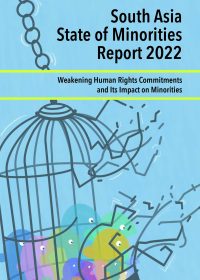Publications
South Asia State of Minorities Report 2022
The condition of minorities in South Asia, home to a fifth of humankind, is grim, to say the least. Religious, ethnic and linguistic minorities face persecution; Dalits suffer structural violence; and women and girls besides other gender minorities are subjected to deep-seated intersectional discrimination. This is the outcome of poor commitment by South Asian states to protecting and promoting human and minority rights, and poor implementation of the measures that do exist. Behind much of the failure is South Asian states’ poor engagement with international human rights mechanisms.
The South Asia State of Minorities Report 2022: Weakening Human Rights Commitments and Its Impact on Minorities presents overviews from Afghanistan, Bangladesh, India, Nepal, Pakistan and Sri Lanka on how each of the states have performed in their commitment to human rights standards, and how they deliver, across civil and political as well as social, economic and cultural rights for their minorities.
This publication is the sixth in the series, following the earlier South Asia State of Minorities Reports: Mapping the Terrain (2016), Exploring the Roots (2018), Refugees, Migrants and the Stateless (2019), Minorities and Shrinking Civic Space (2020), and Hate Speech Against Minorities (2021). These reports are put together by the South Asia Collective, consisting of organisations and human rights activists that dream of a just, caring and peaceful South Asia by documenting the condition of the region’s minorities—religious, linguistic, ethnic, caste, and gender, among others—hoping it will contribute to better outcomes for South Asia’s many marginalised groups.

